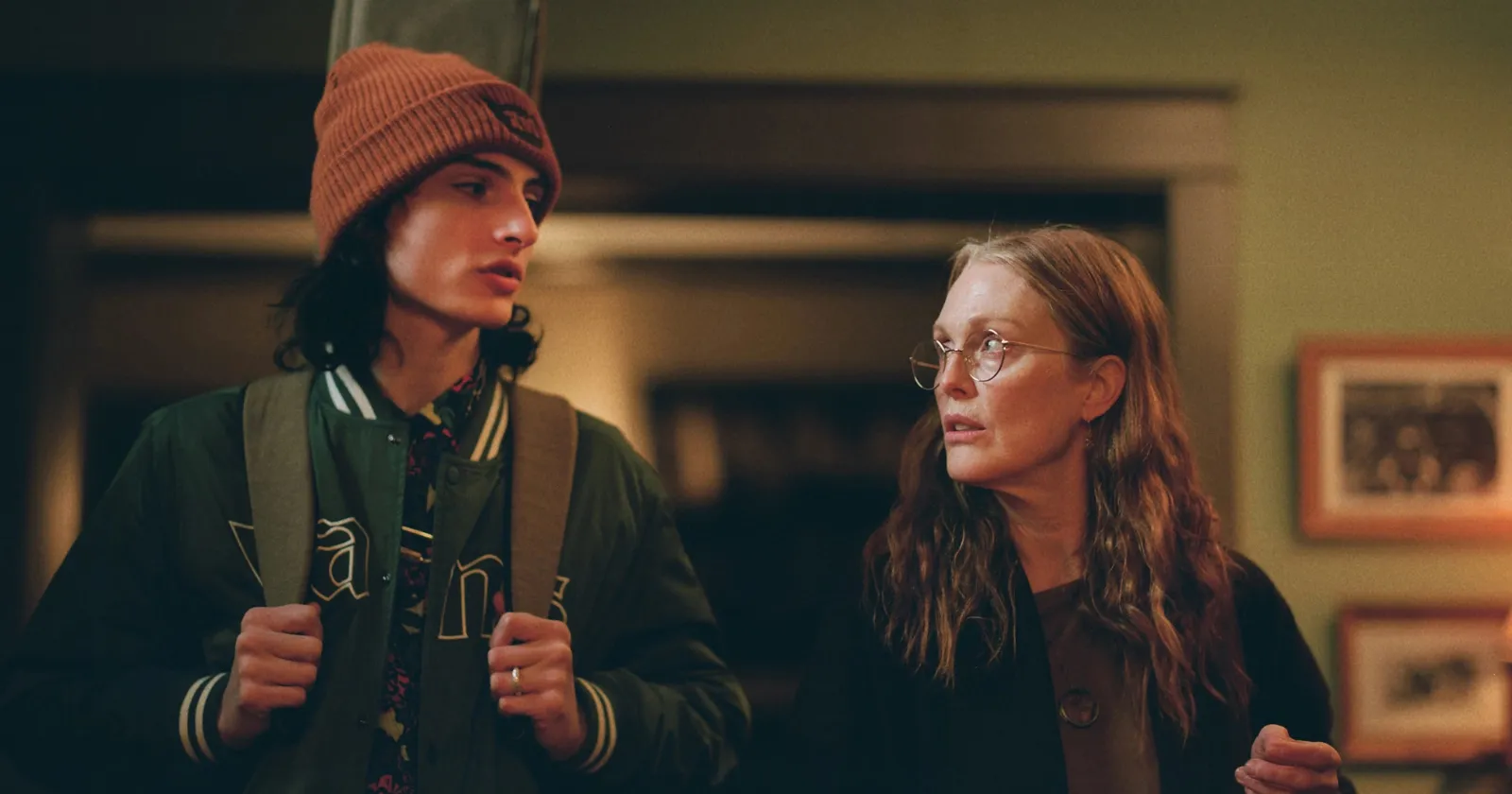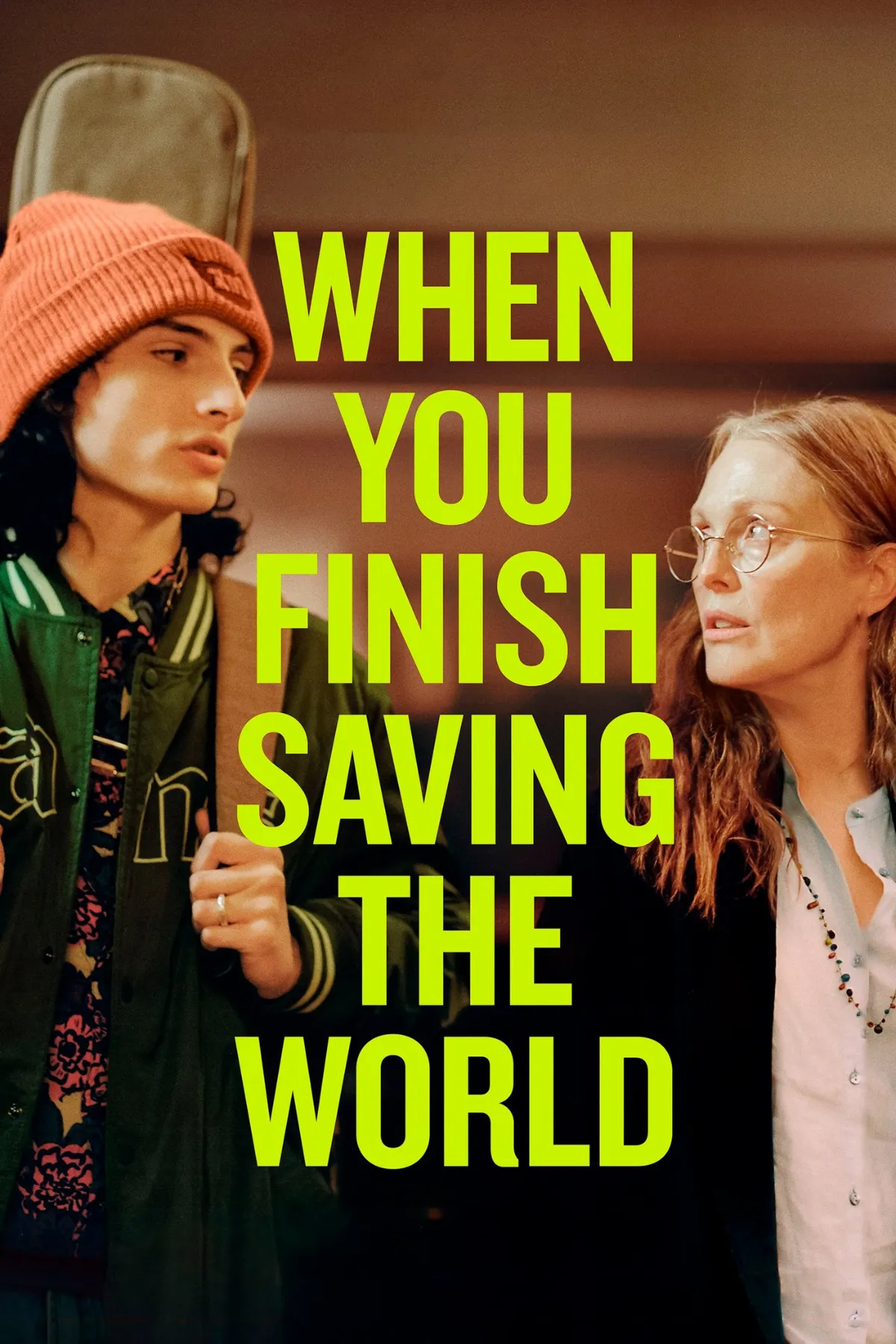Jesse Eisenberg’s first directorial project bathes in the lost art of communication with one another. Combined with powerful performances by Finn Wolfhard and Julianne Moore, When You Finish Saving The World is one of 2023’s first great movies.

‘When You Finish Saving the World’ Movie Review
A24 continues to push for new voices and perspectives behind their releases. Although Jesse Eisenberg may be a seasoned veteran of the film industry in front of the camera, When You Finish Saving The World serves as his debut behind it. And it’s a damn good one. It generally takes auteurs many projects and many years to find a voice, between stylistic, tonal, and topical interests, some filmmakers never hit the grooves of others. But it seems that Jesse Eisenberg spent his acting years developing those interests because this movie feels like the work of someone diving straight into what they find powerful and potent.
When You Finish Saving The World is an understated gem starring Julianne Moore and Finn Wolfhard. At a critical point in both of their lives, Evelyn (Julianne Moore) and her son Ziggy (Finn Wolfhard) are both struggling with how to contribute their talents and interests to make the world better. Evelyn works at a shelter and strikes up a pseudo-parental relationship with an assuming teenager (played by Billy Bryk), while Ziggy attempts to mix politics and music to impress his schoolyard crush Lila (Alisha Boe). Both find that the world is colder and less receptive to positive deeds than they were hoping.
My favorite acting performance ever is Jesse Eisenberg in The Social Network. I might be showing my age a bit because certainly there are more explosive, historic performances by the likes of Nicholson, Brando, Streep, Blanchett, etc., but Eisenberg portraying the deeply misguided and boilingly angry Mark Zuckerberg as he proceeds to build an empire and simultaneously destroy the world is an actor running the gauntlet. He’s graduating from the Aaron Sorkin school of delivery right in front of your eyes, while also bearing witness to the grueling shoots of the infamous David Fincher.
Coming out of The Social Network, Eisenberg became the lonesome, quippy guy that could freestyle at the speed of light while developing densities in his characters on the fly. There’s an insecure and lost undertone to nearly every role he’s had since – from his need to understand what’s impossible to understand in The End of the Tour to his physical every guy quality that he’s not comfortable with in The Art of Self-Defense. He’s arguably my favorite actor because with each performance, I feel like I know Eisenberg the person just a bit more through Eisenberg the actor.
Which is why I think I found When You Finish Saving The World such an interesting and expressive film. It slips through your fingers to the same degree as the guy sitting in the director’s chair, yet I feel like he carves out such a unique voice in just his first film. The movie may lack structural integrity that some of the greats have on display, but every bit of this riveting world oozes with ideas about connecting and communicating with young people in an age where no one communicates face to face.
And perhaps that might just be my favorite part of When You Finish Saving The World – Eisenberg seems to be struggling to figure out the answers as he mines idiosyncratic stories about teenagers livestreaming and moving through life all too fast. As cliché as it sounds, and this may be a cop out response to the criticisms that I’ve seen being launched its way, but the imperfections are why this movie kinda works. It’s not aimless; it’s trying to figure out the answers knowing that they seem to be so impossible to figure out (kinda like Eisenberg’s characters since the late 2000s).
Eisenberg tabs Julianne Moore and Finn Wolfhard to play the mother/son relationship of Evelyn and Ziggy. Admittedly, I found Ziggy’s insecurities about politicking your politics a bit more interesting and deep than Evelyn’s search for personal accomplishments, but again, that may change with age. Ziggy’s grappling with how to make a difference in the future, while Evelyn’s trying to correct her own misgivings about her past. Each are equally successful in their portrayals, but Ziggy’s storyline seems a bit more contemporary and necessary given the state of the country today. Kids care more about politics and the human condition than ever before, and Ziggy being openly conflicted and confused about these ideas felt genuinely new to me.
And because of all these ideas, When You Finish Saving The World feels like a uniquely understated juggernaut that ricochets through your brain during a lean and crisp 88 minutes. Few movies accomplish this level of intricacy and nuance in double the runtime – it’s quite astonishing that, again, this is Jesse Eisenberg’s first directorial project. But at the same time, he’s learned how to navigate tone from the greats. He’s worked with Fincher and Noah Baumbach and James Ponsoldt and Greg Mottola – directors that seem to have their fingers on the pulse of a younger generation than their own.
READ MORE MOVIE REVIEWS: Sharper, Ant-Man and the Wasp: Quantumania, Infinity Pool
I saw quite a few negative reactions for this movie out of film festivals last year, and while I can generally understand some of the negative blurbs critiquing the lack of threads being weaved throughout, I found it to be a deeply emotional and resonating work. The song Ziggy sings to his crush Lila (Alisha Boe) is one of my favorite scenes in a movie in a while. The little moments eventually stack up and I couldn’t deny the movie’s impact. There’s a timely quality to this movie’s release – very few films feel quite like 2023 the way When You Finish Saving The World does.
Watch When You Finish Saving the World on VOD
When You Finish Saving the World Cast and Credits

Cast
Julianne Moore as Evelyn
Finn Wolfhard as Ziggy
Billy Bryk as Kyle
Alisha Boe as Lila
Crew
Director: Jesse Eisenberg
Writer: Jesse Eisenberg
Cinematography: Benjamin Loeb
Editor: Sara Shaw
Composer: Emile Mosseri